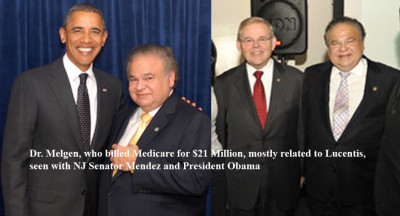March 23, 2014- interviewed by Steven E. Greer, MD
With catheter based methods for replacing the aorta valve not being adopted as expected, the medical device industry is now looking to the mitral valve for hope. Doctors in London and Canada performed Read more »
 April 9, 2014- By Steven E. Greer, MD
April 9, 2014- By Steven E. Greer, MD
The release of data by Medicare showing what each doctor earns from billing CMS is making news for the outlier doctors who billed for millions. One Miami ophthalmologist, for example, billed for $21 Million in 2012 alone. Also catching our eye was another Florida interventional cardiologist who billed for $18.1 Million.
Just how many stent cases per day would he have had to have performed to bill for $18.1 Million? We asked Dr. William O’Neill of Henry Ford Hospital. Read more »
Thromboembolic stroke caused by atrial fibrillation is the primary reason patients are placed on anticoagulation. However, those blood thinners also carry significant bleeding risks. As a result, various mechanical surgical approaches have been tried to prevent stroke, and obviate the blood thinners.
The newly approved Boston Scientific Watchman left atrial appendage occlusion device aims to prevent clots from forming and migrating to the brain. We interviewed Dr. William O’Neill of Henry Ford Hospital, a leading interventional cardiologist, about the Watchman, and whether it will truly allow patients with A-fib to stop warfarin or other blood thinners.
Interviewed by Steven E. Greer, MD
William O’Neill, MD of Henry Ford discusses the recent pivotal data for the Medtronic CoreValve device, soon to be approved, and how this new device will compete in the clinical arena with the Edwards Lifesciences Sapien valve.
William O’Neill, MD of Henry Ford Hospital discusses renal denervation devices used to treat refractory hypertension. He is involved with the Medtronic device trials.
Interviewed by Steven E. Greer, MD
William O’Neill, MD of Henry Ford discusses the finances of transapical aortic valve implantation (TAVI) and why the $30,000 pricetag for the devices should be closer to $5,000. He also discusses the overall market size for TAVI.
William O’Neill, MD of Henry Ford discusses bioabsorbable coronary stents, and the U.S. Abbott trials. They devices are approved in Europe and being well adopted. Because the stent goes away, long-term anticoagulation is not required, and aneurysms are possibly less of a problem.
Interviewed by Steven E. Greer, MD
The clinical adoption of Transcatheter Aortic Valve Replacement (TAVR) has been slower than expected due to reimbursement rates that cause most cases to be financial losses for the medical centers. We discussed the issue with TAVR pioneer, William O’Neill, MD, of the Henry Ford Hospital.
Interviewed by Steven E. Greer, MD
William O’Neill, MD, Director of the Structural Heart Disease Center at Henry Ford Hospital, discusses how the new Transcatheter Aortic Valve Replacement (TAVR) procedures are creating productive collaborations between cardiac surgeons and interventional cardiologists. As a result, more traditional open heart valve replacements are also happening. He then discusses the CMS reimbursement policy that makes TAVR cases money losers for the medical centers.



